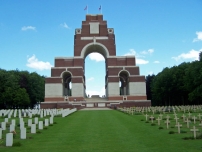| First Name: | William | Last Name: | SMITH | |
|---|---|---|---|---|
| Date of Death: | 04/03/1917 | Lived/Born In: | Bayswater | |
| Rank: | Private | Unit: | Lincolnshire2 | |
| Memorial Site: | Thiepval Memorial, France | |||
Current Information:Age-22 12, Poplar Place, Bayswater
During February and March, 1917, the Germans made a strategic withdrawal to a new and very strong line running from Arras to Soissons. By doing this they eliminated two large salients and greatly reduced the number of troops needed to man the new defences. As they pulled back to the Hindenburg Line (Siegfriedstellung) they adopted a ‘scorched earth’ policy, systematically destroying everything in their path so as to leave nothing behind that would assist the enemy. Railways and roads were dug up, wells poisoned and even trees chopped down. Mines and booby traps were set to further hinder the British and French troops who followed up behind them until they reached the new formidable defences where one again trench warfare was established. On 4th March, 1917, as the Germans were in the process of falling back to the Hindenburg Line, 24 Brigade and 25 Brigade of 8th Division launched a successful attack on their rearguard. Their objective was Fritz and Pallas Trenches, between Bouchavesnes and Moislains. 2nd Royal Berkshire supported by 2nd Lincolnshire led the attack by 25 Brigade and on their left 24 Brigade attacked with 1st Worcestershire and 2nd Northamptonshire. In the absence of suitable trenches the troops formed up on tapes in no-man’s-land in the dark. It was cold and at zero hour, 5.15am, snow was falling but this proved no obstacle to the men of 8th Division who soon captured their objectives. 2nd Lincolnshire in support sent forward men to ‘mop-up’ behind 2nd Royal Berkshire, making sure that no Germans were hidden in any dug-outs. Another company moved forward to hold the original line while others served as carrying parties, taking forward ammunition and other supplies to those out front. The Brigade Diary recorded that these carrying parties lost direction in the fog of war and as a result suffered many casualties. Overall the operation was a success but it did not come without a cost. 8th Division suffered over 1100 casualties during these two days including two men who sank to their waists in mud and died of exposure before they could be dug out. Among those killed from 2nd Lincolnshire was William Smith. |
||||
| « Back to Search Results | ||||
| If you think any of the information shown here is incorrect, Click Here to submit your amends and comments | ||||




